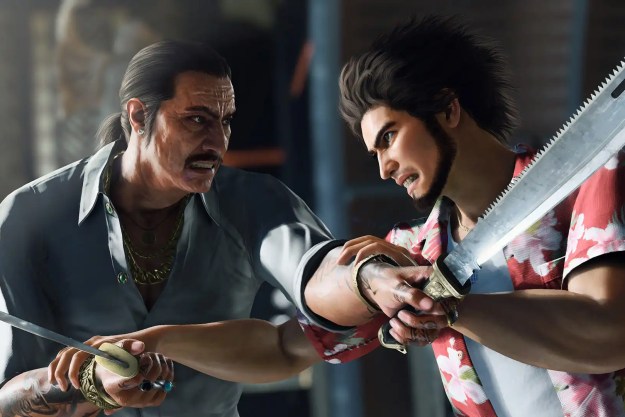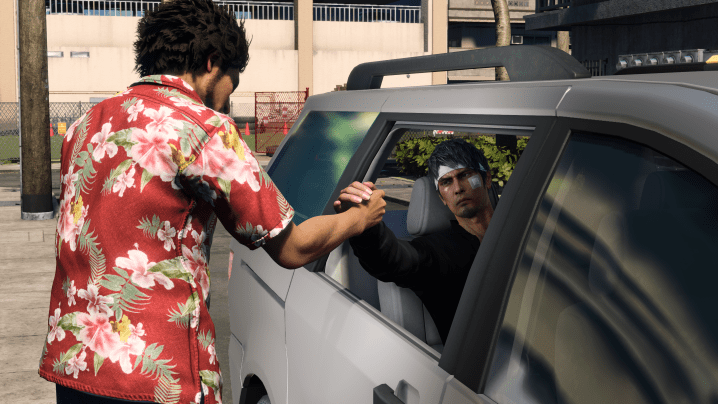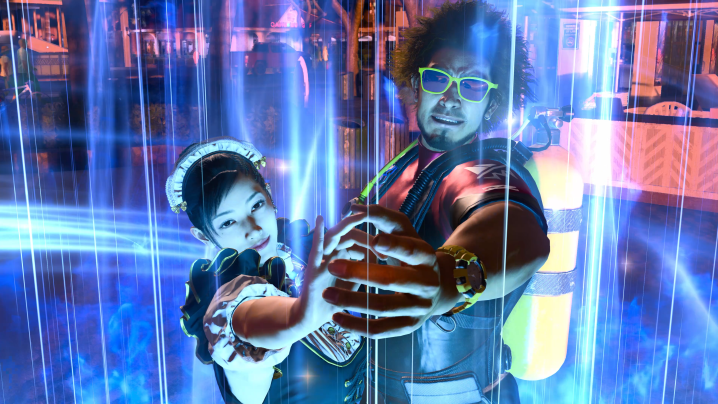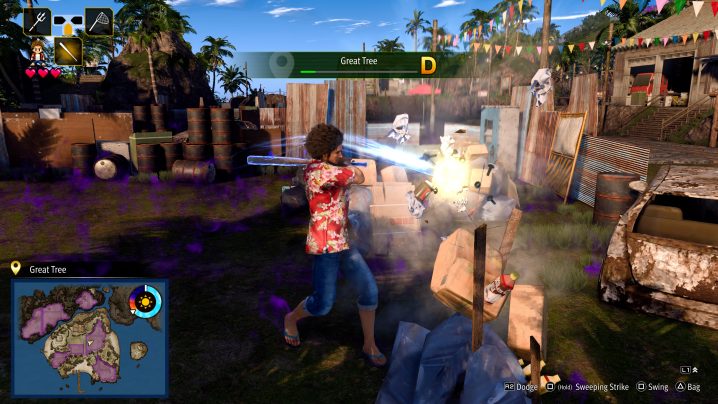
“Like a Dragon: Infinite Wealth offers an embarrassment of riches for fans of gaming's best soap opera.”
- Fantastic story
- Tight, meaningful combat
- Detailed Hawaiian setting
- Full of deep side content
- Dondoko Island is a delight
- Story pacing issues
- Some exhausting repetition
I’m taking a leisurely stroll through Like a Dragon: Infinite Wealth’s digital Honolulu City when I catch a bizarre sight. An old man runs up to a food stand, orders a shaved ice with no flavoring, and proceeds to toss it into the air. He bolts off in a panic, and I continue with my walk, chuckling at the scene. Hours later, I’m on the verge of tears. It turns out that man is desperate to show his ailing wife snowfall one more time before she passes away, a desperate attempt to make up for the lost time he spent working instead of cherishing the time he had with her.
Like the best Like a Dragon substories, the self-contained tale sums up the massive RPG’s sprawling story in a fraction of its runtime. Like a Dragon: Infinite Wealth, a sequel to 2020’s Yakuza: Like a Dragon, is a complex epic about two heroes struggling to figure out what to do with the limited time they have left on Earth. One’s simply facing a midlife crisis after a life-altering layoff; the other is staring death directly in the face thanks to a sudden cancer diagnosis. Those two journeys come together to tell a life-affirming story about how it’s never too late for your life to begin — and it does that between battles with a rogue Roomba with a taste for human blood.
Like a Dragon: Infinite Wealth is the most emotionally impactful chapter in gaming’s best soap opera. It struggles to stay fully engaging from start to finish due to a supersized runtime filled with exhausting exposition dumps, but developer Ryu Ga Gotoku Studio delivers a deeply personal story that’s serious without sacrificing its heart. If any video game could leave you with a new lease on life, it’s this.
A tale of two himbos
Like a Dragon: Infinite Wealth picks up a few years after Yakuza: Like a Dragon, where Ichiban Kasuga successfully disbanded multiple Yakuza families in an event now known as The Great Dissolution. Life has been great for the optimistic hero since then. He’s got a new job helping reformed criminals rejoin the workforce, and he’s working up the courage to ask his pal Saeko on a date. All of that, unfortunately, comes crashing down thanks to a series of mishaps. Thus begins an enthralling narrative that intersects with the remaining Yakuza families, a religious organization, and an animated VTuber with a knack for digging up dirt.
Whereas Yakuza: Like a Dragon was a “rags to riches” story, Infinite Wealth chronicles a more relatable climb up from rock bottom. Put all of the overwhelming deep dives into the criminal underworld aside, and you’re left with a deeply moving story about Kasuga trying to find a new purpose in life after tying so much of his identity to a fickle job that didn’t love him back. That journey takes him all the way to Hawaii as he searches for a mother he never met (who just so happens to be a new target for the Yakuza), the first step in rebuilding his life.

That touching journey works as well as it does, thanks to Infinite Wealth’s dual protagonist setup. Yakuza hero Kiryu Kazuma joins Kasuga’s party this time, though he’s still operating in the shadows after faking his death in Like a Dragon: The Man Who Erased His Name. Kiryu turns out to be the perfect foil for Kasuga, and not just because he’s a pessimistic loner. The Dragon of Dojima reveals that he’s suffering from cancer and only has six months to live, time he intends to spend working himself to death. It’s through those two approaches to life and the ways we often have to fight to survive that Infinite Wealth delivers a poignant story of hope. It’s like the anti-Last of Us Part 2.
While that setup does produce plenty of self-reflective moments that are sure to stick with me long-term, it does sell Kiryu’s story just a little short. The iconic hero plays second fiddle to Kasuga throughout, only getting three of the game’s 14 chapters fully dedicated to his story. Ryu Ga Gotoku spends much of that runtime waxing nostalgic by tying off plot threads from Kiryu’s previous adventures. Though a touching tribute to Kiryu, there are times when it feels like a bit of self-indulgence for the studio as it reminisces on its history with the series and passes the torch to its new hero. Less time is spent in the present with Kiryu, which takes some power out of his loaded story.
Kasuga and Kiryu’s interweaving journeys make for a true video game epic …
Even then, one could argue that the structural decision underlines the looming tragedy even more. Kiryu himself refuses to live for the moment. He’s self-medicating by wrapping himself up in another criminal underworld conspiracy that dredges up a history he’s perhaps too scared to leave behind. Though his few chapters leave me wanting, it’s enough to deliver Kiryu’s most powerful gut punch yet as he struggles to find the one bucket list item that matters to him. He’s not so different from that man throwing shaved ice into the air, desperate to create one perfect moment before it passes him by.
Taken as a whole, Kasuga and Kiryu’s interweaving journeys make for a true video game epic that’ll make you want to put down your controller and call your mom.
The power of friendship
To reinforce those themes further, Ryu Ga Gotoku doubles down on its RPG systems introduced in Yakuza: Like a Dragon. That game traded in real-time brawling for turn-based battles to underline Kasuga’s obsession with RPGs that let players grow over time. While that meta layer is less pronounced here, the system is tweaked just a bit to speak to a different theme: the power of friendship.
Everything that worked in Yakuza: Like a Dragon continues to stand out in Infinite Wealth.
Interplay between party members is a bigger part of battles this time. By leveling up social bonds through collectible conversations and bar room chats, party members gain passive perks that work alongside traditional attacks and spells. They’ll auto-attack downed enemies more often and be able to pull off combo attacks with proper positioning (another system Infinite Wealth smartly tweaks by letting characters move within a circular radius during turns). It’s all another clever reflection of Kasuga’s character. He’s a bright-eyed hero who holds his loved ones close and believes in the power of teamwork. Battles better emphasize that in the reworked system.
That does present a small missed opportunity when it comes to Kiryu’s chapters. One would think that his isolated attitude would be a perfect opportunity to leave his half of the story in Yakuza’s old, solo brawling combat style. While that’s not the case, Ryu Ga Gotoku ingeniously calls back to that in Kiryu’s ultimate ability, in which he breaks out of turn-based combat and starts punching in real-time for a moment. That move replaces Kasuga’s contrasting ability, where his entire party teams up for a high-damage attack that melts big boss bars. It’s a small change, but one that effectively sums up the difference between both heroes.

Everything that worked in Yakuza: Like a Dragon continues to stand out in Infinite Wealth. Gear customization goes deep, Poundmates make for consistently hysterical summons, and magic animations are always a wild ride (my personal favorite spell has to be Essence of Human Grating, a chef-themed attack that’s exactly what it sounds like). The previous game’s signature job system returns with a bit of Hawaiian flair, too, bringing more playful absurdity to brawl. Who doesn’t want to see surfer Kiryu bashing enemies with a rocket-powered surfboard?
While there are plenty of left-field additions like that that see the sequel embrace the concept of “jumping the shark,” Ryu Ga Gotoku heavily relies on callbacks this time around. The eye-popping gags that made Yakuza: Like a Dragon such a delight largely get recycled and doubled here. Evil Roombas? Animal-controlled tractors? Helpful crustaceans? A lot of memorable gags get an encore, leaving less room for Infinite Wealth to surprise in the same way its predecessor did. You can’t blame Ryu Ga Gotoku too much for going back to the well when the water is this good, though.
Endless vacation
Though Infinite Wealth does play the hits, it makes one impactful change that makes Kasuga and Kiryu’s adventure feel special. The majority of the tale takes place in Honolulu City, Ryu Ga Gotoku’s biggest open-world location to date. The Hawaiian locale is a welcome vacation from the streets of Japan, filled with sprawling beaches and real local businesses that make it feel like a loving ode to the real city. The core exploration hasn’t changed, but the change in scenery is a breath of fresh air that has me hoping the series keeps globe-trotting from here.
Switching to an American setting gives the studio more space to play with social satire, too. Some of its best substories read as fierce capitalist commentaries as the city’s inhabitants grift one another or work themselves to the bone to get by. One touching side-quest has Kasuga helping a little boy run a simple lemonade stand so he can afford to buy his mentor a gift before she leaves town. That unassuming tale turns into a business horror story, complete with a greedy “boss” pocketing the profits.
Infinite Wealth is Ryu Ga Gotoku’s biggest game yet, and that’s both its best and worst quality.
Where Infinite Wealth really goes for broke, though, is in its minigames. The Like a Dragon series has always been known for its over-the-top side content that seems to get bigger with each installment. Memorable additions include a hysterical Pokémon Snap parody about photographing perverts and a chaotic dating app game that’s one of the series’ most laugh-out-loud creations yet. Not every piece of side content is a winner; the Pokémon-inspired Sujimon is a fun concept that’s a bit of a repetitive grind to actually play. Even so, there’s so much to do here that players can entirely ignore an entire side game and still spend 100 hours exploring the eccentric world (I hit credit at 60 hours after taking in a heavy helping of side content, but I still had much more to do after).
Infinite Wealth’s most important new addition is also its biggest. Halfway through the story, Kasuga detours to Dondoko Island, where players are introduced to an Animal Crossing minigame. Actually, that word undersells the mode; it’s a macrogame. Dondoko Island is a full-on management simulator that has players turning a trash-filled island into a thriving city. It’s fairly repetitive at first, with its emphasis on constantly collecting resources to craft items (and it’s an absolute momentum killer when it interrupts the story), but it grows to a shockingly in-depth degree once visitors start moving in.

It’s Ryu Ga Gotoku at its most creatively energized, and it leaves me wondering what the studio could accomplish if it took a break from the constant churn of the long-running series. At the rate at which Like a Dragon is growing, the studio’s future feels unsustainable. Infinite Wealth is its biggest game yet, and that’s both its best and worst quality. Everything is supersized like an American Meal Deal, right down to exhausting exposition that often grinds the exciting story to a halt. The dual protagonist setup only exacerbates that problem by having players repeat the RPG’s most tedious tasks, like long social link conversations, when swapping parties at the halfway mark. There’s a functional irony to the fact that players will have to spend so much time grinding through a game about a hero who’s determined to work himself to death.
Put the sprawling criminal underworld saga aside, and you’ll find a much more focused story at the heart of Like a Dragon: Infinite Wealth. It’s a poignant tale of two middle-aged men fighting to reclaim their identities from a world that marries our self-worth to our jobs. Perhaps it’s easier to drown ourselves in work than to nail down how we actually want to spend our short lives and with whom. Don’t think of it as a somber send-off for Kazuma Kiryu; think of it as an opportunity for one of gaming’s best stories to find itself.
Like a Dragon: Infinite Wealth was tested on a PS5 hooked up to a TCL 6-Series R635.




